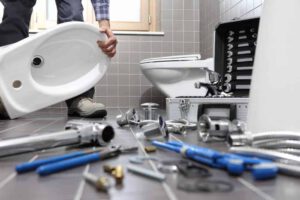What Is Plumbing?
Plumbing is the system of apparatuses and lines within a structure for water distribution and expulsion. Generally, we recognize plumbing from water systems in our city. However, plumbing is not a dull career. In fact, it involves a wide variety of work. It may seem like a boring profession, but you’ll be amazed at how much variety it has! Listed below are some of the different types of plumbing work that you can do.

Different materials are used for water pipes in different homes. Generally, potable water pipes are made from copper and drain pipes from plastic. Plumbers may also use copper or plastic pipes or a combination of both. Moreover, plumbing companies may also use brass compression or speed fittings. Additional materials may include sealants, washers, and cleaning supplies. Plumbing companies will also have a few overheads, like travel, which they can offset by using their own materials.
The most common piping materials include galvanized steel, copper, polybutylene, and cross-linked polyethylene. Copper tubing is similar to galvanized steel but has a smaller diameter and is less prone to corrosion. Copper is also the best choice for hot water supply, as it tends to last longer than other materials. PVC pipes are popular, but they may leak. For this reason, plumbing professionals recommend that you replace the pipes with stainless steel ones.
Installation
The National Plumbing Code was first published in 1933 and is a set of standards for proper plumbing installation. It provides a modern code to protect health and safety. In 2017, IAPMO took over ownership of the NSPC and all of its editions. This move will ensure the continued development of the code. In addition to following the National Plumbing Code, plumbers and contractors will use the most current code when installing plumbing. Here are some tips for ensuring your new plumbing installation goes smoothly.
First, determine which walls you want to move. You may need to cut drywall and make space for a shower or tub. Once you’ve done that, you’ll need to shut off the power and check all of the wirings to be sure it’s safe to use. Remove any cables that may be in the way. Once you’re clear of any hazard areas, you can begin installing your plumbing. You can then follow the guidelines and code for your locality.
Maintenance
Maintaining the overall condition of your plumbing system is an important aspect of preventive maintenance. Even if your system is new, it may be prone to problems if you don’t perform regular maintenance checks. Using preventive maintenance techniques can detect problems before they get out of hand. You can even schedule scheduled repairs to keep the pipes in good working condition. Checks should include clogged drains and pipes, clogged sinks and toilets, and valves that require adjustment or replacement of the gasket or filter.
Routine plumbing maintenance will extend the service life of your plumbing fixtures, appliances, and equipment. It will also prevent you from having to spend a fortune on repairs and replacements. By following a few simple guidelines, you can keep your plumbing system running smoothly for years to come. If you’re unsure of how often to perform plumbing maintenance, you can call the professionals. They offer excellent plumbing maintenance services and have over 50 years of experience.
Cost
You can get an idea of the cost of plumbing by using HomeGuide’s service. Plumbing estimates vary a lot, based on different factors. If you’re planning to build or renovate a new home, you should be financially prepared to cover any plumbing costs. By understanding the complexities and how plumbing costs vary from project to project, you’ll be able to prepare your budget for the work and anticipate the resulting expenses.
Installing new plumbing can cost anywhere from $2,100 to $15,000, depending on the size of your home and the type of pipe you’re using. It can cost more if you’re replacing an entire water main. Plumbing can cost up to $15,000 for a large home, but it can be cheaper for a smaller home. Listed below are the different types of plumbing costs. Some factors that affect the price are the number of bathrooms, the distance between bathrooms, and the number of stories.
Career opportunities
There are many different types of career opportunities for plumbers. They can work in offices, hospitals, homes, and other places where water is essential. Some plumbers manage city-wide water systems. Others are involved in the design and expansion of water systems, or even in developing new plumbing technologies. Most plumbing companies promote energy-efficient plumbing installations. In addition to being in demand as plumbers, these workers have many benefits.
Plumbing is a specialized field that involves a variety of materials, tools, and knowledge. For example, a pipefitter can design and install underground pipes, and a gas service technician can install gas appliances. A project manager uses years of experience to coordinate projects with other construction specialists. A business owner may also be a plumbing contractor. No matter where you live, there are many career opportunities available for plumbing professionals.
